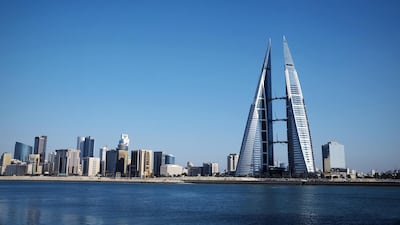Bahrain's move to introduce a value-added tax, days after Gulf allies pledged a $10 billion aid package, will boost the kingdom's non-oil revenues and stabilize the public debt burden, analysts said.
Imposing a five per cent VAT in 2019, combined with wider financial measures, sends a positive signal to the market that Bahrain is serious about fiscal reform, analysts said. Fitch Solutions forecasts a 25 per cent jump in non-oil revenues in 2019 after the introduction of VAT.
"On the whole, VAT implementation is a welcome step towards non-oil revenue generation and evidence of Bahrain’s institutional capacity to respond to its current vulnerable fiscal position," Ehsan Khoman, head of Mena research and strategy at MUFG Bank, said.
Bahrain's legislators on Sunday approved a draft law to introduce VAT for the first time in the country, joining the UAE and Saudi Arabia who implemented the tax in January. The move came after the UAE, Saudi Arabia and Kuwait extended a $10bn aid package to the kingdom that is tied to a set of fiscal reforms. The funds will help stabilize Bahrain's economy after a three-year drop in oil prices weakened growth. The kingdom last week announced a 33-page fiscal plan aimed at eliminating the budget deficit by 2022 as it tries to ease the economy's dependence on oil by finding alternative sources of revenue.
Gross domestic product of Bahrain, which has the smallest GCC economy, is projected expand by 3.2 per cent this year down from 3.8 per cent in 2017, according to the International Monetary Fund. The kingdom which had a 13.2 per cent fiscal deficit last year and 18 per cent in 2016, has seen its debt to GDP ratio surge to above 80 per cent from 43.6 per cent in 2013.
______________
Read more:
UAE, Saudi Arabia and Kuwait give $10bn to support Bahrain reforms
Bahrain bankruptcy law to spur foreign investment
_______________
S&P Global Ratings estimates the introduction of VAT could increase government revenues by about 1.8 per cent of GDP in 2019.
"We believe this is the key measure in the government’s plan to increase non-oil revenues," said Trevor Cullinan, Director, Sovereign Credit Analyst, S&P Global Ratings. "It will be helpful in reducing Bahrain’s fiscal deficit and diversifying government revenues away from the oil sector."
VAT will generate substantial growth in non-oil revenue – Fitch Solutions forecasts a 25 per cent jump in 2019.
"This is coming from a low base, so the impact on the fiscal deficit will be limited,” said Axel Dalman, Mena analyst at Fitch Solutions.
Levying the tax, combined with other planned measures, will come with some initial short-term headwinds but will put Bahrain on a more sustainable fiscal footing in the long-run, analysts said.
For consumers, VAT combined with broader fiscal reforms, could mean weaker consumer demand, less consumer spending and softer consumer confidence, analysts say.
"This will probably affect retailers of big-ticket items, like cars, the most, since consumers are likely to cut back on those types of purchases first," Mr Dalman said.
For the private sector, companies will face one-off administrative costs related to implementing VAT accounting and retailers of luxury goods will likely face weaker demand, he said.
Authorities will also face the task of implementing the tax within the coming months.
"Entities have a narrow timeframe window of less than three months to fully come to terms with the necessary technical and tax systems, as well as regulatory governance and compliance frameworks, in order to efficiently adhere to the 1 January 2019 start date," Mr Khoman said.
Arqaam Capital estimates revenues from VAT will reduce Bahrain's fiscal deficit by about one percentage point.
While introducing VAT is a step in the right direction, the government additionally needs to make deep spending cuts to reduce the budget and current account deficits in the medium term, analysts say.
Reining in the public wage bill, considering energy price reforms, streamlining public sector spending and continuing economic diversification efforts would help reduce the deficit, Jaap Meijer, managing director at Arqaam Capital, said.
These adjustments could initially temper economic growth in the kingdom but would ensure improved fiscal health, analysts say.
"Fundamentally, the implementation of VAT does point to an important policy shift towards leaning more on non-oil revenue, which will be positive for long-term fiscal stability - but only if such efforts are sustained and built on over a multi-year time period," Mr Dalman, said. "On its own, it is far from enough to plug Bahrain’s large fiscal gap."

